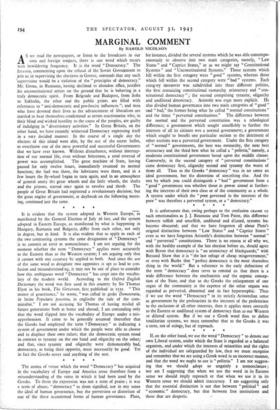It is evident that the system adopted in Western Europe,
as manifested by the General Election of July 26 last, and the system adopted in Eastern Europe, as manifested by what is happening in Hungary, Rumania and Bulgaria, differ from each other, not only in degree, but in kind. It is also evident that to apply to each of the two contrasting systems the same designation of "Democracy " is to commit an error in nomenclature. I am not arguing for the moment whether the term " Democracy " applies more accurately to the Eastern than to the Western system; I am arguing only that it cannot with any accuracy be applied to both. And since the use of the same word to designate two opposites is apt to lead to con- fusion and misunderstanding, it may not be out of place to consider how this ambiguous word " Democracy " has crept into the vocabu-
lary of the modern world. According to the Oxford English Dictionary the word was first used in this country by Sir Thomas Elyot in his book, The Governor, first published in 1531. " This maner of gouernance," he wrote, " was called in greke Democratia, in latine Popularis potentia, in englisshe the rule of the corn- minaltie." I am• not accusing Sir Thomas of having misled all future generations both at home and abroad; I am contending only that the word slipped into the vocabulary of Europe under a mis- apprehension. It came to be generally assumed thereafter that the Greeks had employed the term Democracy " as indicating a system of government under which the people were able to choose and to displace their own rulers; that the democratic system stood in contrast to tyranny on the one hand and oligarchy on the other; and that, since tyranny and oligarchy were demonstrably bad, democracy, as being their opposite, must necessarily be good. Yet in fact the Greeks never said anything of the sort.
* * * *


























 Previous page
Previous page